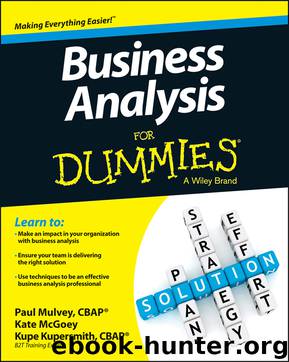Business Analysis For Dummies by Kupe Kupersmith

Author:Kupe Kupersmith
Language: eng
Format: epub
Publisher: Wiley
Published: 2013-06-25T16:00:00+00:00
Chapter 9
Making the (Business) Case
In This Chapter
Knowing why you need to make a business case in the first place
Including all the right elements in your business case
Understanding and writing effectively for your audience
Choosing the right presentation
A business case is a compelling argument you give in order to get approval to embark on your suggested course of action for addressing the business need. So what’s included in a business case? Is it a document? A presentation? Who’s it for? When do you develop a business case, and what level of detail should you provide to support your opinion or case? This chapter answers these questions and more and provides a rationale for how a business case can also be used effectively as an analysis technique.
Before You Dive In: Breaking Down Business Case Basics
A business case outlines an opportunity and a recommendation to invest resources to take advantage of it. Think of the business case as your marketing or sales brochure for your idea. It may be your one shot to get approval for a project that may have a significant strategic, structural, or political corporate impact. A compelling case requires enough facts about the recommendation to make it credible and the correct positioning for the audience or reader to buy into it. The following sections show you the pros of creating a business case (consider it our business case for business cases) and help you nail down your audience and business case structure.
A business case can take various forms, including a formal or informal document, a presentation, or a walk-through of a simulation. We cover presentation considerations in the later section Presenting the Business Case.
Looking at the benefits of writing a business case
The primary purpose of a business case is to sell a viable solution for a clearly defined business problem or new product to the company that’s hired you. It’s part of enterprise analysis (more about that in Chapter 2) at the point when you identify the problem or finalize the solution and request funding for it.
Not all companies require you to develop a business case, although most organizations do if you request funding above a certain amount. Even if a business case isn’t mandatory, you may still find value in writing one for these reasons:
To provide insight into the viability of your solution or idea: At a minimum, writing the executive summary and mission statement (we talk about those elements in the later section Defining and Presenting the Opportunity) can give you incredible insight into the viability of a solution or idea you’re considering. Creating these items also helps you organize and collect your thoughts and validate what may just be a gut feeling that this solution is correct. Writing the business case out also provides a foundation for further analysis and solution development.
To support a feasibility study: A feasibility study is an analysis effort to determine whether the opportunity can be reasonably achieved. Presenting a strong business case can garner you support for conducting this study.
Download
This site does not store any files on its server. We only index and link to content provided by other sites. Please contact the content providers to delete copyright contents if any and email us, we'll remove relevant links or contents immediately.
Rich Dad Poor Dad by Robert T. Kiyosaki(6632)
Bad Blood by John Carreyrou(6621)
Principles: Life and Work by Ray Dalio(6446)
Playing to Win_ How Strategy Really Works by A.G. Lafley & Roger L. Martin(6301)
Management Strategies for the Cloud Revolution: How Cloud Computing Is Transforming Business and Why You Can't Afford to Be Left Behind by Charles Babcock(4572)
The Confidence Code by Katty Kay(4260)
Thinking in Bets by Annie Duke(4226)
American Kingpin by Nick Bilton(3886)
Delivering Happiness by Tony Hsieh(3425)
Project Animal Farm: An Accidental Journey into the Secret World of Farming and the Truth About Our Food by Sonia Faruqi(3221)
The Power of Habit by Charles Duhigg(3139)
The Tyranny of Metrics by Jerry Z. Muller(3072)
The Marketing Plan Handbook: Develop Big-Picture Marketing Plans for Pennies on the Dollar by Robert W. Bly(3062)
Brotopia by Emily Chang(3053)
Mastering Bitcoin: Programming the Open Blockchain by Andreas M. Antonopoulos(3042)
I Live in the Future & Here's How It Works by Nick Bilton(2997)
The Content Trap by Bharat Anand(2924)
Building a StoryBrand by Donald Miller(2912)
Applied Empathy by Michael Ventura(2902)
